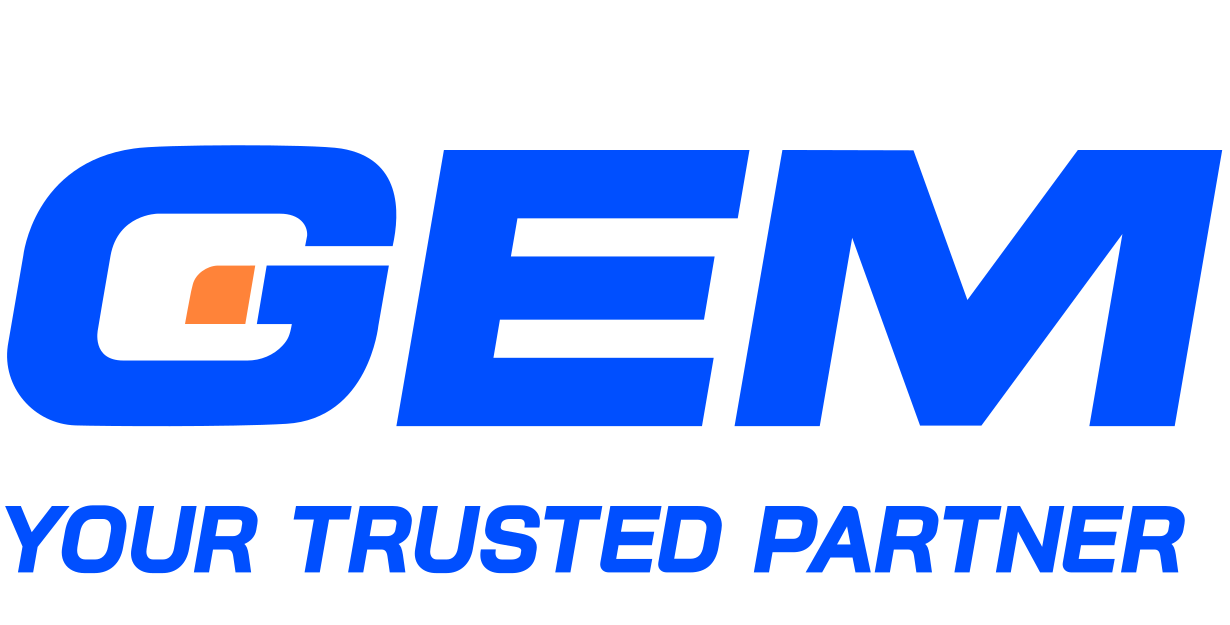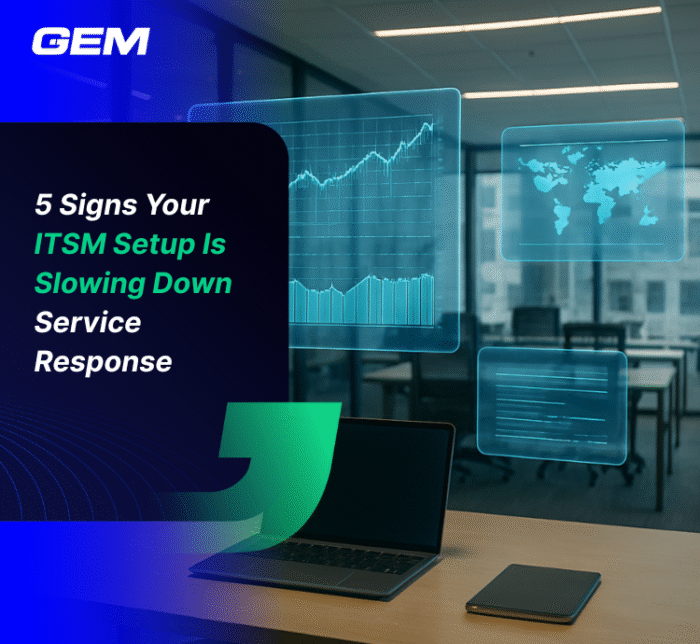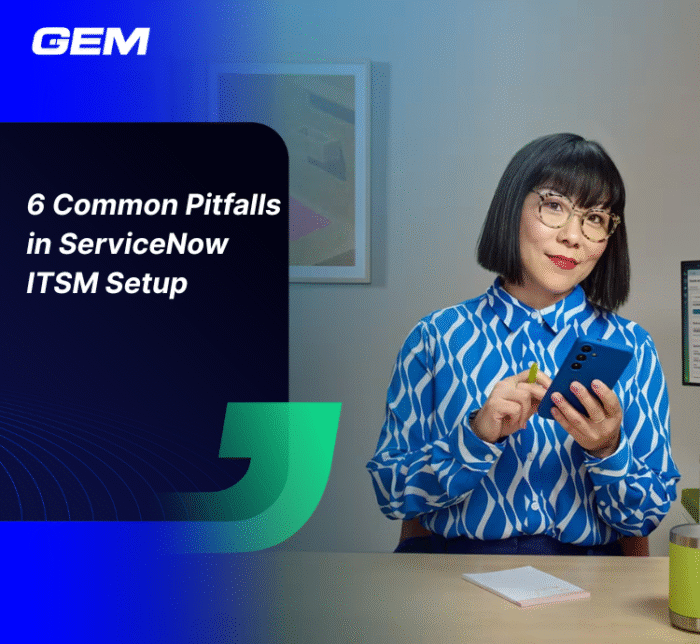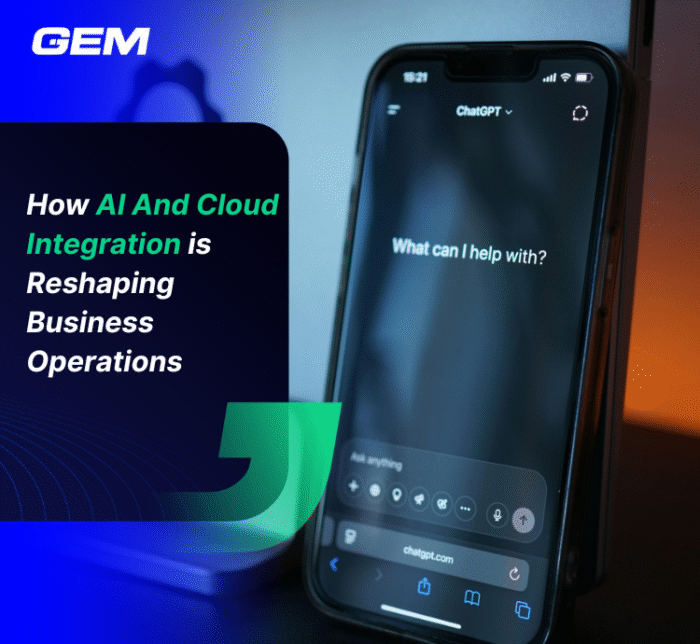Contents
Customer experience has become a top priority. 73% of consumers now say it directly impacts their purchasing decisions, ranking just behind price and product. As more businesses look to upgrade their service operations, two platforms often come up: Salesforce Service Cloud vs ServiceNow CSM. Both offer enterprise-grade capabilities, but their strengths reflect different starting points and use cases. This article breaks down how each platform approaches customer service, automation, AI features, and cross-team workflows, so you can make an informed decision based on your team’s priorities.
What is Salesforce Service Cloud?
Salesforce Service Cloud is a customer service platform built on CRM architecture, designed to help businesses manage and scale their support operations. It brings together customer interactions from multiple channels – phone, email, chat, messaging, and social, into a single workspace. This allows teams to deliver faster, more consistent service across touchpoints.
The platform includes a wide range of capabilities: case management, AI-driven agent assistance, self-service portals, workflow automation, and tools for managing field service operations. These features are aimed at increasing agent productivity, improving response times, and maintaining service quality as support volumes grow.

Core Function
Salesforce Service Cloud is a CRM-based system built to support customer-facing teams across service, sales, and marketing. It centralizes customer data and service workflows, helping organizations manage the full lifecycle of customer interactions. Its foundation on the Salesforce platform means it benefits from native integration with other Salesforce products, allowing for seamless data sharing and automation across departments.
Key Capabilities
- Omnichannel Support: Connects customer interactions across phone, email, SMS, web chat, WhatsApp, and social media, routing cases to the right agent based on availability and expertise. This helps maintain context across channels and eliminates service silos.
- Case Lifecycle Management: Automates the intake, routing, escalation, and resolution of service cases. Agents can view full case histories, prioritize tasks, and collaborate internally to resolve issues faster.
- AI-Powered Tools (Salesforce Einstein): Uses AI to recommend next-best actions, surface relevant knowledge articles, automate routine responses, and forecast service trends. Einstein Copilot and Einstein Bots support both agents and customers.
- Self-Service Portals and Knowledge Bases: Empowers customers to resolve issues on their own through branded help centers, community forums, and searchable knowledge articles. Reduces case volume while improving customer autonomy.
- Field Service Operations: Coordinates mobile workforce scheduling, dispatching, and on-site service. Features include real-time tracking, mobile access to job details, and inventory management.
- Customizable Agent Workspace: Offers a unified console where agents can access case data, customer history, and AI recommendations in one place. The workspace is configurable to match team priorities and workflows.
Who It’s For
Primarily sales and customer service teams in mid-sized to large organizations. Especially relevant for B2B and B2C operations where high-touch support, fast resolution times, and seamless cross-channel engagement are key to customer retention.
Key Strengths
- Strong Integration Across Salesforce Ecosystem: Ties directly into Sales Cloud, Marketing Cloud, and Commerce Cloud, giving teams a 360-degree view of the customer. This shared data model supports better coordination across the customer journey.
- Advanced Service Tools for Proactive Engagement: Features like predictive case routing, real-time analytics, and AI-powered insights push teams toward proactive service models rather than reactive case handling.
- Large Marketplace for Extensibility (AppExchange): Thousands of pre-built apps and components available for integration, including tools for telephony, analytics, compliance, and vertical-specific needs. Reduces development time for custom features.
Best Fit
Organizations that prioritize external customer engagement and want to unify service with sales and marketing. Often selected by customer-centric businesses in industries such as financial services, telecom, manufacturing, healthcare, and retail.
What is ServiceNow CSM?
ServiceNow Customer Service Management (CSM) is a cloud-based platform designed to unify customer service operations by connecting customers, service agents, and internal departments, including IT, field service, and operations, within a single system of action. It supports an omnichannel experience, offering communication across messaging, chat, voice, and email, while also providing self-service capabilities through portals and virtual agents. Built on the Now Platform, it leverages AI and automation to streamline case resolution, improve visibility across teams, and shift service delivery from reactive support to proactive engagement.
The platform aims to prevent issues before they occur, resolve them faster when they do, and align service delivery with operational workflows across the organization.
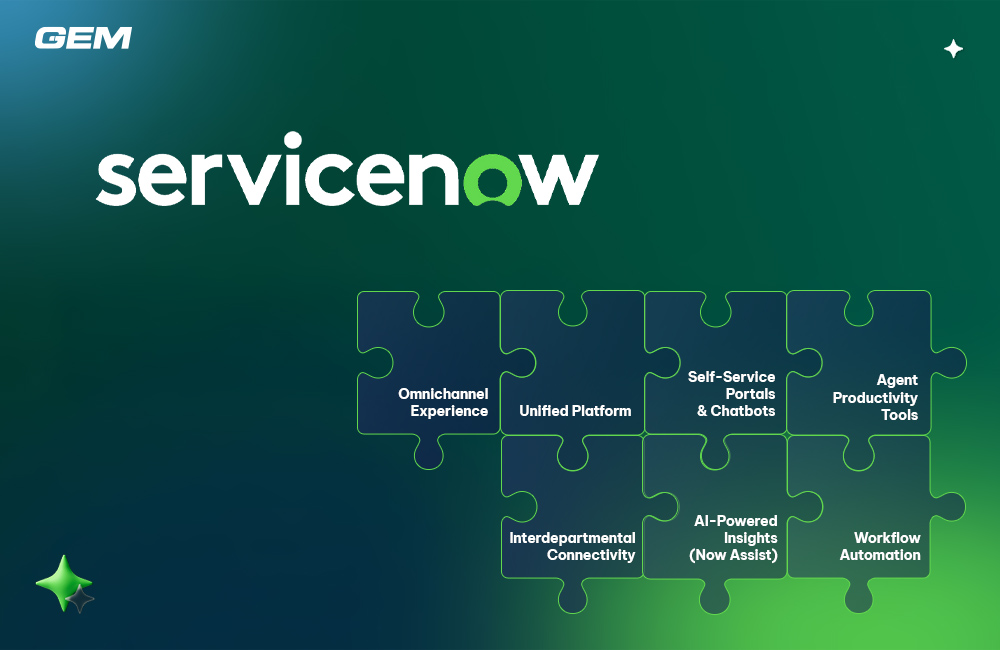
Core Function
A cloud platform built to automate complex service workflows and create custom applications, with native strength in IT Service Management (ITSM) and operations support.
Key Capabilities
Omnichannel Experience
Customers can engage through their preferred channels while agents manage conversations from a centralized workspace. Context is retained across sessions, improving resolution quality and continuity.
Unified Platform
ServiceNow CSM sits on the same platform as IT, HR, Security, and Operations modules, enabling seamless collaboration across departments without relying on third-party integrations.
Self-Service Portals & Chatbots
Customizable web portals and virtual agents (chatbots) allow users to submit requests, check case status, and access knowledge articles anytime, reducing inbound volume and improving deflection rates.
AI-Powered Insights (Now Assist)
Uses machine learning to recommend actions, summarize cases, and identify trends early. Service teams can detect patterns in recurring issues and address root causes through automation.
Workflow Automation
Automates service processes end-to-end, from case routing to resolution. Tasks can be triggered across multiple systems and departments without manual handoffs.
Interdepartmental Connectivity
Connects front-end service teams with back-office functions like IT, legal, and logistics, ensuring issues that require cross-functional input are resolved without delays.
Agent Productivity Tools
Offers a configurable workspace with case views, knowledge suggestions, and AI-driven recommendations to help agents work more efficiently and prioritize high-impact tasks.
Who It’s For
ServiceNow CSM is primarily used by IT professionals, operations teams, and enterprise service managers focused on internal service delivery and business process automation. It’s often adopted by organizations that already rely on ServiceNow for ITSM or platform workflows and are expanding its use to customer-facing functions.
Key Strengths
Native Integration with IT Operations:
Built on the Now Platform, CSM integrates directly with ITSM, CMDB, and operational workflows, enabling faster root cause identification and resolution for service issues tied to infrastructure or internal systems.
Robust Automation Framework:
Designed to handle complex, multi-step service processes with minimal manual input. This reduces resolution times and improves consistency across teams.
Proactive Service Delivery Model:
Enables teams to identify issues before they impact customers via predictive analytics, monitoring integrations, and event management. This approach helps prevent recurring incidents and improves service reliability.
Best Fit
Enterprises looking to automate and standardize internal service delivery across IT, operations, and support functions. Particularly relevant for organizations with complex infrastructure, high service volumes, or a strong focus on cross-team collaboration.
Read more: What Is ServiceNow CSM? Benefits, Features, and Use Cases Explained
Salesforce Service Cloud vs ServiceNow CSM: Capabilities and Comparisons
The Customer Success Management Software Market size is estimated at USD 2.20 billion in 2025 and is projected to reach USD 5.99 billion by 2030 (Mordor Intelligence). This rapidly growing market has observed the competition between popular names, including Salesforce and ServiceNow!

While both platforms support large-scale service delivery, their architectural foundations and design priorities are fundamentally different. Salesforce Service Cloud is rooted in CRM and excels at managing customer-facing interactions. ServiceNow modules approaches service from an operational workflow perspective, connecting front-office and back-office teams on a unified platform. That difference shapes how their capabilities perform across key areas.
Generative AI (GenAI)
Salesforce Einstein
Salesforce Einstein is embedded across the Salesforce ecosystem, offering generative capabilities in sales, service, and marketing. Einstein GPT and Copilot generate emails, summarize service interactions, and assist agents with recommended responses. While it provides a rich set of tools for customer-facing roles, Einstein’s strength lies in augmenting CRM experiences, rather than orchestrating cross-functional workflows. Its AI outputs are designed to support conversion, personalization, and customer retention.
ServiceNow Now Assist
ServiceNow’s Now Assist brings generative AI into the core of business workflows. It’s built on the Now Platform and leverages proprietary large language models (Now LLMs) tailored for enterprise use. Capabilities include AI-generated case summaries, incident resolution suggestions, and automatic code generation in App Engine Studio. Now Assist also supports external model integration through the GenAI Controller, giving organizations flexibility to use models like OpenAI or Azure OpenAI within ServiceNow-native workflows. A key differentiator is Now Assist’s alignment with operational data and process logic, enabling AI that’s not just conversational but action-oriented.
Customer experience (CX)
ServiceNow CSM vs. Salesforce Service Cloud
Salesforce Service Cloud
Service Cloud delivers strong omnichannel engagement through voice, chat, email, and social channels. It integrates with Salesforce’s Customer 360 platform to provide personalized experiences and detailed interaction histories. Features like Service Console, Knowledge Base, and Einstein Bots support frontline agents in managing inquiries and resolving issues. Its strengths are in customer-facing workflows, ideal for organizations focused on retention, loyalty, and digital engagement.
ServiceNow CSM
ServiceNow’s Customer Service Management (CSM) goes beyond ticket handling, it connects customer service with fulfillment, IT operations, and backend support functions. CSM includes case management, knowledge management, AI-driven routing, and performance analytics. It’s designed for high-volume service environments where operational complexity and cross-departmental coordination are common. For example, if a customer incident involves product failure, CSM can automatically route tasks to field service, logistics, and engineering teams.
ServiceNow FSM vs. Salesforce Field Service
Salesforce Field Service
Salesforce Field Service focuses on customer appointments, technician scheduling, and visit outcomes. It supports mobile technicians with real-time updates and integrates with the Service Cloud to maintain a consistent customer experience. It’s commonly used in industries where field service is part of direct customer interaction, such as home services, healthcare, and retail installations.
ServiceNow FSM
ServiceNow’s Field Service Management is built for operational field support, especially in asset-intensive industries like telecom, utilities, and manufacturing. It offers intelligent dispatching, SLA tracking, real-time GPS, and mobile access for field technicians. FSM is tightly integrated with ITSM and CSM, making it suitable for use cases where field service is an extension of broader incident or problem management processes.
ServiceNow Sales and Order Management (SOM) vs. Salesforce SFA, CPQ, and Order Management
Salesforce SFA, CPQ, and Order Management
Salesforce provides a modular sales stack: Sales Cloud for pipeline and lead tracking, CPQ for quote automation and pricing logic, and Order Management for deal fulfillment. These tools are well-integrated within the Salesforce ecosystem and offer strong analytics and forecasting features, especially when combined with Marketing Cloud and Commerce Cloud. The focus is on growing revenue through personalized sales engagement and automated deal progression.
ServiceNow SOM
Sales and Order Management (SOM) on the Now Platform consolidates the lead-to-renewal process, linking pre-sales, quoting, order capture, fulfillment, and post-sale support into a single flow. It provides real-time visibility across teams, including operations, finance, and support, reducing fallout and manual rework. SOM is particularly useful for B2B organizations with complex product configurations and fulfillment requirements.
IT Service
Salesforce ITSC
IT Service Center (ITSC) is a lighter IT support offering in the Salesforce ecosystem, originally developed by a third party. It lacks a native CMDB, is not tightly integrated with IT operations, and has not seen active roadmap updates since 2022. It’s positioned more as a simple help desk tool than a full ITSM solution.
ServiceNow ITSM
Recognized as a market leader in ITSM, ServiceNow ISTM provides a comprehensive suite covering incident, problem, change, request, and asset management. It includes a native CMDB, virtual agents, and predictive intelligence for faster resolution and service optimization. ITSM integrates with ITOM and SecOps, giving IT teams end-to-end visibility into infrastructure, compliance, and service health.
Employee experience (EX)
Salesforce HRSC
HR Service Center leverages Salesforce’s CRM engine and Slack integration to manage employee-facing casework. While it supports self-service and agent collaboration, it is primarily used for HR ticketing. Its capabilities are narrower than HRSD, with less emphasis on lifecycle event orchestration and interdepartmental workflows.
ServiceNow HRSD
HR Service Delivery (HRSD) provides employees with guided experiences for onboarding, benefits, and internal services. It includes lifecycle event templates, case management, and knowledge portals. HRSD also integrates with IT, legal, and facilities workflows, making it ideal for enterprise service centers or shared services environments.
Automation and low-code
Salesforce MuleSoft + Flow
MuleSoft provides API-based integration capabilities and RPA through Composer. Salesforce Flow enables users to automate CRM activities like lead routing, quote approvals, and email sequences. While powerful within the Salesforce ecosystem, broader enterprise workflow automation often requires custom integrations.
ServiceNow Automation Engine
Combines RPA, API orchestration, workflow automation, and Integration Hub in a single platform. It allows teams to connect external systems, automate repetitive tasks, and scale complex processes across the enterprise. Paired with App Engine Studio, both technical and business users can build workflows without writing code.
Cybersecurity
Salesforce Data Security & Privacy
Focuses on protecting sensitive data within Salesforce clouds. Tools like Salesforce Shield offer encryption, field audit trails, and security monitoring. While data-focused, it does not offer native security incident response or risk workflows.
ServiceNow SecOps
Security Operations (SecOps) integrates threat intelligence, vulnerability scanning, and incident response with IT workflows. It connects to the CMDB to assess risk impact and orchestrate remediation tasks across teams. SecOps is suited for enterprises needing structured security lifecycle management.
Integration and Customization
Salesforce AppExchange and Customization
Offers a robust marketplace with thousands of third-party apps. Lightning App Builder and Flow support low-code development for CRM workflows. Salesforce admins can quickly extend functionality, but full-scale enterprise integration often requires MuleSoft or external tools.
ServiceNow Integration and Customization
Built for extensibility, ServiceNow connects with ERP, IT, and other enterprise systems through Integration Hub and REST APIs. App Engine supports large-scale custom app development with built-in governance. ServiceNow also provides domain separation and instance-level customization for regulated industries.
Comparison Table: ServiceNow vs. Salesforce
| Capability Area | Salesforce Service Cloud | ServiceNow |
| Platform Foundation | CRM-centric platform (Customer 360) | Unified workflow platform (Now Platform) |
| GenAI Capabilities | Einstein GPT, Copilot, predictive CRM insights | Now Assist, GenAI Controller, AI-generated workflows |
| Customer Management | Omnichannel intake and CRM-based case handling | Operational issue resolution across departments |
| Field Service | CRM-aligned mobile field service | Integrated with IT/CSM, predictive scheduling |
| Sales & Orders | Modular SFA, CPQ, order management | Unified SOM for quote-to-renewal |
| IT Service | Basic ITSC, limited roadmap activity | Full ITSM with CMDB, AI, and automation |
| Employee Services | HRSC for case tracking and self-service | HRSD with lifecycle events, cross-functional workflows |
| Automation | Salesforce Flow, MuleSoft API/RPA integration | RPA, API, low-code app development (Automation Engine + App Engine) |
| Security | Data security via Shield, audit logs, and access controls | SecOps with threat, vulnerability, and response workflows |
| Integration | AppExchange, Lightning components, MuleSoft for external systems | Integration Hub, REST APIs, App Engine, domain separation |
| Best For | Customer engagement, sales and marketing alignment | Enterprise operations, IT-led transformation, service-based workflows |
Stop trying to find the dots. Let us help you connect them!
Salesforce Service Cloud vs. ServiceNow: Which One to Choose?
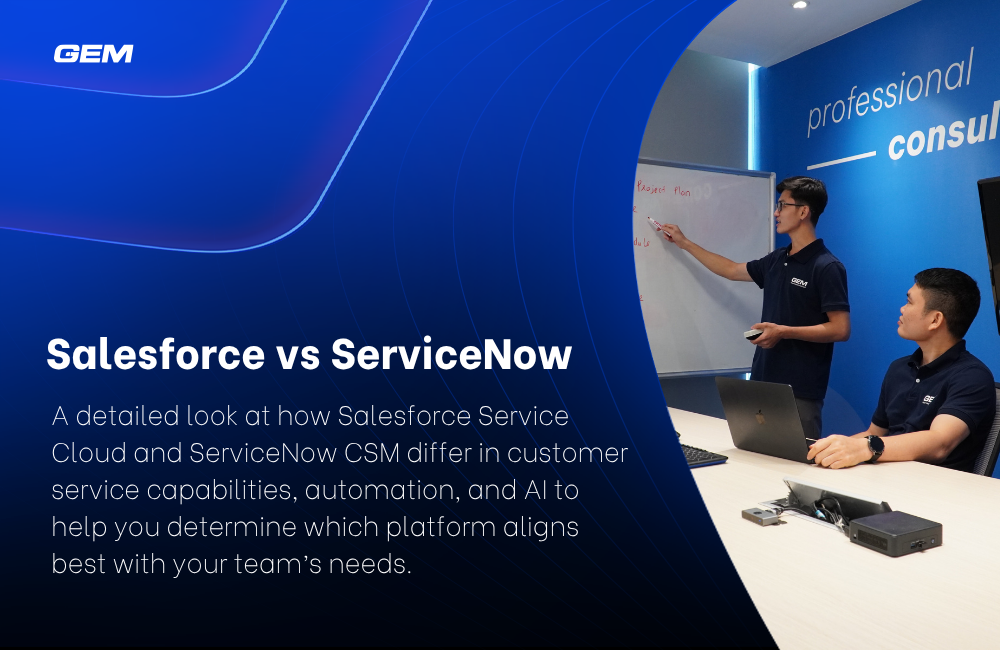
Choosing between Salesforce Service Cloud and ServiceNow comes down to how your organization defines “service.”
If your focus is on managing and enriching customer relationships through multichannel engagement, personalized support, and sales alignment, Salesforce Service Cloud is designed for that purpose. If your goal is to streamline service operations across departments, automate workflows, and integrate service delivery from intake to resolution, ServiceNow offers a fundamentally different approach.
1. Service Strategy: Customer Engagement vs. Operational Resolution
Salesforce Service Cloud is built around the CRM model. It’s optimized for front-office teams – sales, support, and marketing, who need unified visibility into customers and tools to personalize every interaction. It excels in managing customer touchpoints, automating follow-ups, and supporting digital experiences.
ServiceNow, on the other hand, focuses on end-to-end service resolution. It connects customer service agents with internal teams like IT, logistics, and finance. This makes it more suited for organizations where service involves multiple departments and complex processes, not just customer communication, but also issue resolution, asset management, and field coordination.
2. Platform Orientation: CRM Stack vs. Workflow Engine
Salesforce is a CRM-first platform. Its ecosystem – Sales Cloud, Marketing Cloud, Commerce Cloud, revolves around the customer lifecycle. Salesforce Service Cloud extends those capabilities into service management, but always from a CRM foundation.
ServiceNow is a workflow engine. Its Now Platform is purpose-built for automating tasks, orchestrating cross-functional workflows, and standardizing service models across business units. It’s about how work gets done across an enterprise.
3. Use Cases by Function
Sales and Marketing-Led Organizations
Choose Salesforce Service Cloud if your service model is deeply tied to sales outcomes, customer loyalty programs, and marketing insights. The platform is especially effective for B2C and high-velocity B2B environments where speed and personalization drive growth.
Operations and IT-Led Organizations
Choose ServiceNow if service delivery includes infrastructure, IT support, compliance workflows, or field operations. It’s frequently adopted in manufacturing, telecom, financial services, and public sector environments where internal and external services are tightly connected.
4. Integration Across the Enterprise
Salesforce integrates well within its own suite and offers a robust third-party marketplace (AppExchange). For broader enterprise integration, especially with legacy systems, MuleSoft is typically required.
ServiceNow offers native integration with ITSM, HR, security, and facilities teams. Its Integration Hub and App Engine allow organizations to extend functionality across departments without relying on external stacks. This makes it more suitable for organizations running shared service centers or enterprise operations hubs.
Read more: List of Problem Solving Strategies Names in ServiceNow: 6 Strategies
5. Scalability and Customization
Both platforms are highly scalable and support extensive customization. Salesforce provides strong low-code tools for CRM-centric applications. ServiceNow offers low-code and pro-code tools for building enterprise-grade apps, especially where workflows span multiple departments.
Final Considerations
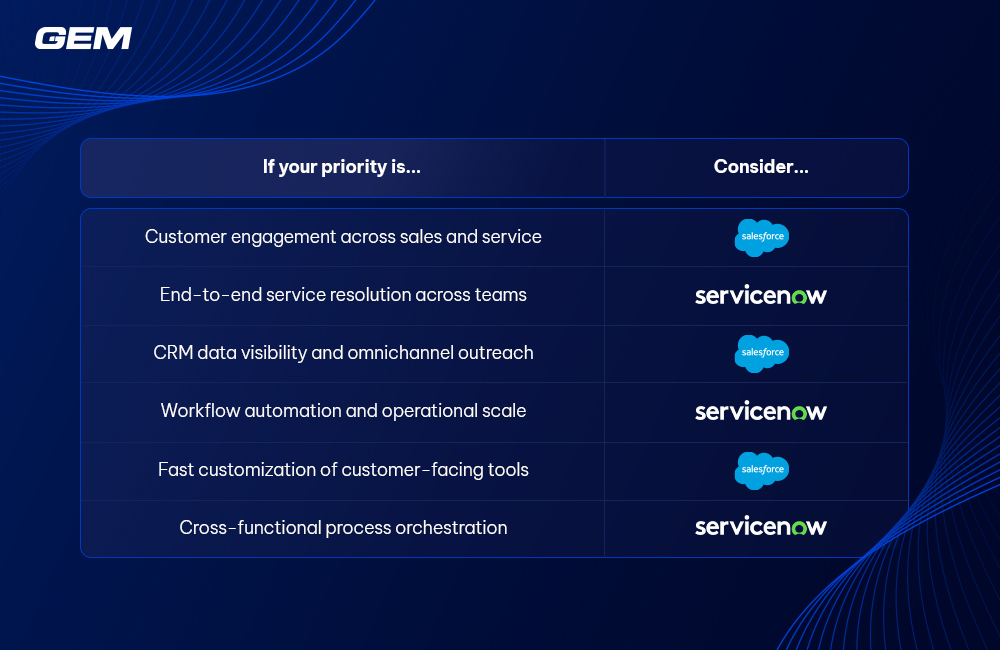
GEM Corporation: Trusted Partner for Salesforce and ServiceNow Transformation
GEM Corporation is a global technology consultancy delivering enterprise-grade digital solutions across Japan, ANZ, Asia, the EU, and the US. Since 2014, we have been a trusted partner to organizations navigating complex transformation through software engineering, platform integration, and tailored service models. With over 400 technology professionals and more than 300 successful projects, we bring deep operational insight and delivery experience across sectors including financial services, telecom, manufacturing, and retail. Our approach is grounded in system thinking, agile execution, and measurable outcomes.
We work extensively across both Salesforce and ServiceNow platforms, supporting clients from strategy to implementation and long-term platform evolution. On Salesforce, our teams focus on Service Cloud, Field Service, and CPQ, designing CRM workflows that unify customer engagement and accelerate sales operations. On ServiceNow, we deliver across ITSM, CSM, HRSD, and App Engine, building service architectures that connect front-line teams with IT, operations, and shared services. Our strength lies in structuring scalable, cross-functional workflows that align business needs with platform capabilities. Whether modernizing customer service or rearchitecting internal operations, GEM delivers solutions that perform under enterprise conditions.
Conclusion
Choosing between Salesforce Service Cloud vs ServiceNow depends on how your organization defines and delivers service. Salesforce offers strong capabilities for customer engagement and sales-aligned workflows, while ServiceNow supports operational scale through connected service delivery across teams. Each platform brings strengths shaped by its core architecture, CRM-first versus workflow-driven. For enterprises with diverse service models, the decision often comes down to integration scope, internal complexity, and long-term platform alignment.
To explore which approach fits your business, contact GEM Corporation to start the conversation.
How do the two platforms compare in terms of generative AI capabilities?
Both Salesforce and ServiceNow have embedded GenAI into their platforms, but their approaches differ. Salesforce leverages its Einstein GPT framework across Service Cloud for case summarization, response generation, and agent productivity. ServiceNow applies GenAI through its Now Assist platform, focusing on resolution automation, knowledge generation, and internal workflow acceleration. The choice depends on whether the AI use cases are more customer-facing or resolution-driven.
Which platform is better suited for IT and employee experience (EX) use cases?
ServiceNow has a stronger foundation in IT service management and internal workflows, making it a preferred choice for organizations prioritizing IT operations and employee experience. Its native modules for ITSM, EX, and HR workflows align closely with CSM. Salesforce, while capable, is more focused on customer-facing service and sales operations.
Can both systems support field operations and order management?
Yes, but the modules differ. Salesforce offers dedicated products like Field Service, CPQ, and Order Management to support end-to-end customer operations. ServiceNow addresses field operations through FSM (Field Service Management) and order processes through its SOM (Sales and Order Management) suite. Organizations should evaluate how deeply the service and order processes are integrated with customer or operational systems.
How do integration and customization options differ between Salesforce and ServiceNow?
Salesforce provides extensive integration through its AppExchange ecosystem and API-first design, especially within sales, service, and marketing functions. ServiceNow offers deep customization through low-code/no-code tools and native cross-departmental workflows across IT, HR, and operations. The better fit depends on enterprise architecture - CRM-led vs. workflow-led, and the level of cross-functional use cases.
